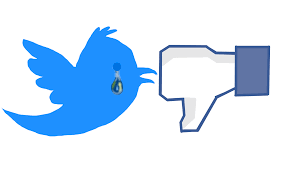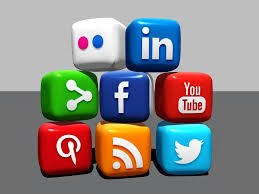There are over 7 billion people walking the earth and almost half of them are internet users. Among Americans alone, research shows that 65% of adults are using social media. That's roughly two-thirds of grown-ups in the U.S. spending almost two hours of every day posting, liking, sharing, tweeting, pinning and commenting.
So, what's all the convo about? That's the great question: What are we posting and why?
Scroll through your newsfeed or homepage and you'll find family, friends, "friends" and even perfect strangers ranting and raving about anything from the current state of a political campaign to the cutest thing their pets did this week. You know it well: there's your standard quotes, memes, photos, YouTube links, and article clips. Then there are the occasional holiday messages, shared product ads and mind games/brain teasers. And of course, there's those other messages... You know... The ones where people just free-write for lines and lines at a time about whatever is on their mind!
If you read through them all carefully, you'll find that most posts fit into one of three very simple categories:
High energy posts -- The poster and post readers feel good about themselves and the world when the post is shared. You've seen these. They are your inspirational quotes, motivational anecdotes, personal posts to share an accomplishment, an uplifting thought or a special moment. Sometimes they are jokes. Other times they look like picturesque landscapes or children's milestones. Whatever, their style or content, the energy they carry is joyous and peaceful.
Neutral posts -- This is your typical informative post about a current event or a useful practice. It's educational or at least thought provoking. This also includes the branding posts that share logos, invite you to check out service offerings and also keep you up to date on what's going on. They don't seem to impact your mood much. You're not likely to have a strong emotional reaction. They are however, helpful, or at the very least harmless.
Low energy posts -- These are the "misery loves company" posts. I'm not talking about people who are struggling and want help, or posts informing of a loss or a crisis. I'm talking about those posts where the person posting feels small, afraid, hurt, betrayed, alone, unloved, angry or lost; and rather than dig deep inside themselves to find their power and then connect to others in a way that invites them to find theirs, they provoke, belittle, attack or degrade.
When you're getting ready to post, like, tweet or comment, make sure you are conscious of the energy that your post is carrying and inviting. And think through why you may want to share a low-energy post? Are you venting, shaming, affirming the negative, seeking attention, throwing shade? And is that really the best use of your light?
Instead, be a conscious poster -- a person who understands the impact we can have on one another through the connection of community (including online communities), and who shares energy that speaks to the best of who we are. Honor those connections.
To help get you focused, here are 5 social media personalities that you may recognize. Rethink your posts if any of them are you:
1.The "I know more than you do" folks -- These people share posts that scream, "I know more about God, I know more about science, I know more about us, I know more about you." They take various shapes and can take on varied content, but the voice is always the same... Arrogance! If this is you, be careful that you don't become so sure that you've figured it out, that you shame others into feeling "less than," isolate the people who could really help you to continue learning and close yourself off to your own growth.
2.The "I'm on the toilet right now" people -- These folks provide the rest of the world with a look into every second of every moment of their lives, much of which other people don't really want to know. They too, can include a wide array of messages, but the real message is always the same: "I would feel more important and more valuable if more people validated more of what I do!" If you fall into this category, think carefully about whether or not you really want to depend that heavily on the attention and opinions of others for your sense of self. With other people's opinions changing like the tide, that becomes a very dangerous road to drive down.
3.The "I'm all business all the time" folks -- These professionals focus exclusively on products, services and branding. Sure, social media is an opportunity for people to get to know pieces of one another on a wide scale and to control the pieces of you that others to get to know. However, if you are trying too hard to control your image, that fear will come right through your timeline. If this sounds like something you do, diversify your material. Yes, you want to get people excited about your business, but that's more likely to happen if people feel connected to you and engaged in your life story.
4. The "You're welcome for yet another selfie" people -- These lookers seem to post a new selfie of some sort every time you see their name. Maybe they experiment with different angles, different filters, different zooms and different photo shop tricks. Or, maybe they have it down to a science, always sharing the best looks they can. Either way, they've mastered the art of photographing themselves. If you're one of these selfie kings or queens, take a break and share your brain. Your appearance is just one of the things that we like about you. We'd also like to see your experiences, read your thoughts and congratulate you on your accomplishments. Don't be afraid to connect more deeply.
5. The "F%*# You! Let's argue in public" folks -- These upset individuals need everyone to know how upset they are, how little they care about what other people think (which is clearly why they are posting it in public), and on a few occasions, who they are upset with. The messages are often disrespectful, distasteful and above all dishonorable to who they are as strong, capable and light-guided souls. If this a thing you are likely to do, think it through. You have every right to be upset by something that hurts your feelings and downs your mood. However, there are so many skills, techniques, practices and opportunities available to you to help you deal with your upset more productively: meditate, exercise, do something creative, converse directly and calmly with whoever hurt you. Why waste your energy creating a low energy online experience for others? It seems beneath your potential.
Now, I'm not the "post police" and the above assessments are not judgments of who people are or their worth in our world. They are simply ideas on what makes us post what we do, how our posts impact one another and what alternatives might help make our social media interactions a bit brighter. So, the next time you start to tweet, post, share, like or comment... Think about the energy that you're spreading and whether or not it reflects the best parts of who you are. Make the choice to be a conscious poster!
References:
Chaffey, D. (2016, April 21). Global Social Media Statistics Summary 2016. Retrieved May 15, 2016, from http://www.smartinsights.com/social-media-marketing/social-media-strategy/new-global-social-media-research/
Mander, J. (2015, January 26). Daily time spent on social networks rises to 1.72 hours. Retrieved May 15, 2016, from http://www.globalwebindex.net/blog/daily-time-spent-on-social-networks-rises-to-1-72-hours
Perrin, A. (2015, October 08). Social Media Usage: 2005-2015. Retrieved May 15, 2016, from http://www.pewinternet.org/2015/10/08/social-networking-usage-2005-2015/



